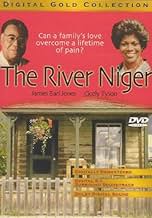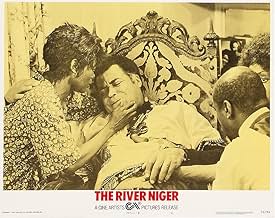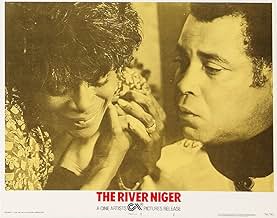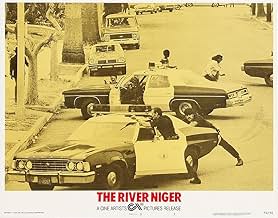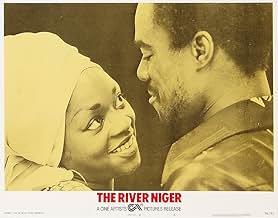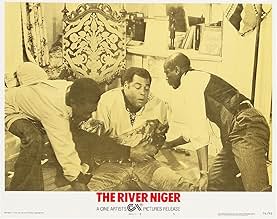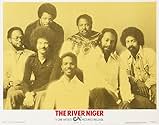Johnny, a house painter and poet, struggles to support his cancer-stricken wife Mattie amid poverty. Their unwavering love helps them overcome hardships, finding solace in the River Niger.Johnny, a house painter and poet, struggles to support his cancer-stricken wife Mattie amid poverty. Their unwavering love helps them overcome hardships, finding solace in the River Niger.Johnny, a house painter and poet, struggles to support his cancer-stricken wife Mattie amid poverty. Their unwavering love helps them overcome hardships, finding solace in the River Niger.
- Awards
- 1 win total
Louis Gossett Jr.
- Dr. Dudley Stanton
- (as Lou Gossett)
Featured reviews
This is a must see film.This movie is poetry in itself. Thumbs up to this work!!! The unconditional love between Tyson's character and Jones' character exuded the power of 'Black Love'. The very fact that through out the entire movie, you were constantly reminded of God's power and creativity, was captivating, especially the poetry. Turman's character's awakening to the sleeping giant within, to fight the oppressive system that has held back the African American race for generations, decision to fight back with intelligence instead of violence was a move in the right direction to solid change. Violence is only a temporary solution to a life long problem. To not spoil the end, Jones' character, what can I say, selfless hero! This movie should be viewed by all young African American men and women. This will remain a classic!
"The River Niger" is very much a time capsule of the mid-1970s. There's a lot of good acting, some bad acting, and some pretty much middle of the road direction. The director, Krishna Shah, is probably the main thing which keeps this good film from being great. He just doesn't have a real vision for this sort of thing. As you might expect from a stage adaptation, Joseph A. Walker's script is why this is worth watching. He writes excellent dialogue, characters, and best of all - poetry. Then again, there's a bit too much emphasis on the self-conscious black identity stuff, even for 1976.
James Earl Jones, who plays the poet, is the best thing about "The River Niger". He is very compelling, intense, and instantly likable. His performance, along with that of Louis Gossett Jr. (credited here as Lou Gossett), makes one wish there was a better made film to frame it. Definitely worth seeing, though.
James Earl Jones, who plays the poet, is the best thing about "The River Niger". He is very compelling, intense, and instantly likable. His performance, along with that of Louis Gossett Jr. (credited here as Lou Gossett), makes one wish there was a better made film to frame it. Definitely worth seeing, though.
I love James Earl Jones and Cicely Tyson as a couple. They live in the ghetto or slums of Los Angeles, California in the 1970s. The rest of the cast includes the under-used Hilda Haynes and Louis Gosset Jr. The story of Johnny Williams as a poet and his ill wife played by Tyson is not so bad and their surroundings are undesirable as they battle crime, gangs, violence, and living in a tough part of the city. Jones and Tyson are a formidable pair and strong together on screen and they are worth watching the film alone even if it's not that great on paper. JOnes's performance elevates the role into a complex character of JOhnny Williams and there are familiar actors and actresses also in this film. The River Niger might not be that great but it's not that bad and Tyson and Jones are so strong together that you can see them at odds as well. Johnny loves his wife, Mattie, and strives as a poet but the scene where he reads to Mattie is heartbreaking, emotional, and worth watching. I didn't care for the other scenes involving the gangs, violence, and crime. I just loved watching Tyson and JOnes as a couple.
There are several things to understand about this movie. 1. The actors and actresses are African American and at the time of the movie were not necessarily appreciated for their outstanding talents that have been showcased in later years. 2. Comments that the "gang" members were hokey perhaps come from those who have never been residents in the Watts area of LA, the south side of Chicago or the east side of Detroit in the early 1970's. (3) I find that the use of the"n" word brings about discussion with today's students of communication and film who are products of the rap culture's influences. All in all the film's adaptation from the original play is a good one.
This movie starred some heavy-hitter actors, Black or otherwise: James Earl Jones, Cicely Tyson, Louis Gossett Jr., Glynn Turman, and a couple of other familiar faces. There is a lot going on in the movie without there being a clear direction toward any one thing.
Johnny Williams (James Earl Jones) was a hopeless alcoholic whose sole source of pride was his military son, Jeff (Glynn Turman).
Jeff was like many young Black men in the 70's, he wanted more than what the world was willing to give him, but most of all he wanted to be his own man.
The movie had some erudite moments from both Johnny and Jeff, but at other times it seems to wander hoping to survive on poignant rhetoric. Unfortunately, I was watching a bad dub because the sound would drag and the picture quality was bad even for 1975--and this was an Amazon Prime video!
But, I'd never hold video or sound quality against a low budget drama. The overall product wasn't that great, but it had its moments and considering the budget was probably barely enough to cover bus fare to and from shoots, I'll give it a pass.
Johnny Williams (James Earl Jones) was a hopeless alcoholic whose sole source of pride was his military son, Jeff (Glynn Turman).
Jeff was like many young Black men in the 70's, he wanted more than what the world was willing to give him, but most of all he wanted to be his own man.
The movie had some erudite moments from both Johnny and Jeff, but at other times it seems to wander hoping to survive on poignant rhetoric. Unfortunately, I was watching a bad dub because the sound would drag and the picture quality was bad even for 1975--and this was an Amazon Prime video!
But, I'd never hold video or sound quality against a low budget drama. The overall product wasn't that great, but it had its moments and considering the budget was probably barely enough to cover bus fare to and from shoots, I'll give it a pass.
Did you know
- TriviaJames Earl Jones and Cicely Tyson worked together again on Broadway in The Gin Game from 2015 to 2016.
- ConnectionsReferenced in Call Me Angel, Sir (1976)
Details
Contribute to this page
Suggest an edit or add missing content


